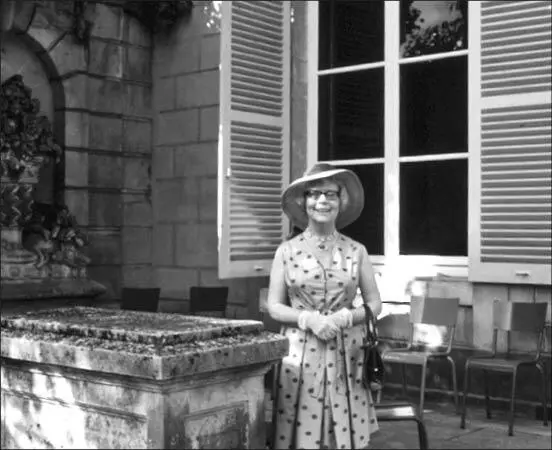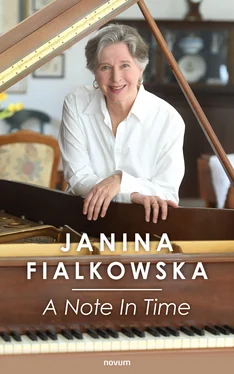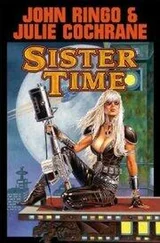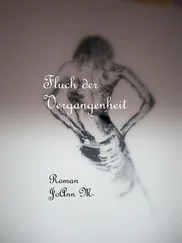The fun began when Mme. Lefébure arrived. She would be driven into the courtyard like royalty, followed by a large retinue comprising her husband and various sycophantic assistants and admirers, each with their own function: one to carry her music scores, another her shawl, another her glasses case and another her umbrella. She was tiny, but with a perfect little figure and masses of hair of a rather determined shade of gold (she was sixty-eight years old at the time) tied back in a chignon from whence long wisps would escape and fly about dramatically while she played. She wore magnificent straw hats with brightly coloured ribbons to match her outfits, and tiny little shoes with the highest heels imaginable. Dreadfully short-sighted, she wore thick glasses with dark frames, and when she was pleased she would grin, showing all her teeth and conjuring up memories of Lewis Caroll and the Cheshire Cat. She had an aura of stardom about her, due primarily to her extremely strong personality and her conviction of her superiority to all of those around her. She cut a striking, quasi-Napoleonesque figure as she paraded through life, constantly surrounded by a coterie of devoted fans.
For the course I had prepared the sixth partita of Bach, the second Ballade of Chopin and Ravel’s “Jeux d’eau”. These were new pieces for me, but I had worked very hard on them under Biddy’s supervision and was well prepared. Since nothing much was expected of a fifteen-year-old girl from far-off Canada, my playing surprised them and caused quite a stir. Mme. Lefébure enjoyed teaching me because I tried so hard and could understand and absorb what she showed me fairly quickly. Her star pupil at that time was Imogen Cooper. I was a little in awe of Imogen, who seemed so relaxed and professional and who played the fourth Ballade of Chopin and Debussy’s “Reflets dans l’eau” exquisitely. She seemed to have so much more maturity as a musician than I had, although we were almost exactly the same age. There was a little rivalry between us, but nothing serious, as I already admired her and she, I think, was reasonably impressed with me. I lost track of her after this summer, only to meet her again after fourteen years in 1980 when she turned up backstage at my London recital debut; we have been close friends ever since and I continue to be in awe of her prodigious talent and profound musicianship.
Early on in the course, Biddy approached Mme Lefébure to ask her if she could take her photo. The reaction was swift: absolutely not, she wasn’t prepared for such a thing – total horror at even the suggestion of such a bold request. Biddy was amused and thought no more about it until a week later when, sitting quietly in the garden reading during a break in the afternoon session, she was accosted by Imogen, who had come out of the Pavilion in search of her with the announcement: “Madame is ready.” Biddy, a trifle taken aback, asked: “What for?” It appeared that Madame was ready to be photographed. And so it was that we have some lovely photographs of Mme. Lefébure standing in the garden of the Pavillon de Noailles all dressed up in her gold silk dress with bright purple polka-dots, her matching purple silk shoes, and a great big straw hat with a wide purple ribbon around it, looking as pleased as punch with herself.

In the master class she would sit in the front row near the performing student, her eyes closed as if in prayer, listening intently. When the pupil had finished, a feeling of tense expectation hovered over the company. Everyone watched Madame, not daring to utter a sound. Sometimes she would nod and say: “Bravo!” and then everyone would applaud enthusiastically and cheer lustily. But if Madame were displeased, the assistants would leap into action like a pack of jackals, tearing the poor frightened student to shreds. This was definitely not a playground for sissies, more like an ancient Roman arena. I was, luckily, one of the survivors.
As a result of this first encounter with Madame Lefébure, I returned to Paris a year and a half later to become her private pupil. She had resigned from her position at the Conservatoire de Paris just before I arrived, and it was generally thought that she had taken this step to dissimulate the fact that she was fast approaching seventy – the mandatory retirement age in France.
Biddy and George took a small apartment in Saint-Cloud, after two earlier brief occupancies in other locations where the neighbours complained so bitterly about my practising that we had to move. Even in Saint-Cloud I could only practise a couple of hours a day on a muted piano in our flat, and spent most of the time working either in an unheated garden-house owned by a local school, in which there was an upright piano, or in the basement of the Steinway dealer in Paris. The garden house was pleasant in the spring and summer but was cold and damp in winter; I had to work in my overcoat and was forever catching colds. Biddy was not very well at the time, and although she still attended most of my lessons, she had finally started leaving me alone while I practised, the cold in the garden house helping my emancipation enormously. However, I almost welcomed her presence at the lessons because of Freddy. Freddy, Madame Lefébure’s husband, was very tall and as messy looking as she was neat, with long straggly hair and a face like that of a predatory bird. He was a source of general amusement amongst the students, except when he would find one of us girls alone, and then he was not so entertaining but downright lecherous. Biddy came in handy for this reason, although she herself was not exempt from his attentions, which seemed only fair as Madame had a huge crush on my father and would flirt with him outrageously whenever she had the opportunity. Freddy saw himself as a brilliant conductor, although none of us ever found evidence of his ever having conducted anything at all. However, when a pupil in the class was playing a concerto and someone had to play the orchestral reduction part on the second piano, he would position himself by the wretched accompanist and conduct very much in their face singing loudly. This could be rather disconcerting, as he spat a lot when he spoke or sang and would invariably be smoking as well, never flicking off the ashes but allowing then to fall gently all over one’s hands or onto the keyboard. Amazingly, Mme. Lefébure, who rather endearingly lived in an enchanted world where only music existed and only her view of music-making prevailed, seemed oblivious to Freddy’s shenanigans and quite tolerant of his deplorable behaviour. She was sometimes even influenced by his opinions, which always seemed strange to her followers as she was so much better a musician and brain than her husband. She once confided in Biddy that she was “au fond, une petite bourgeoise1” who liked to save her money but was invariably hard up because Freddy spent so much of her money on his petites amies. Rumour had it that Freddy was a frequent guest in certain Parisian establishments of ill repute. Freddy was also as short-sighted as she was, but would happily drive her all over Paris, paying no attention to traffic lights or parking restrictions or indeed anything to do with basic regulations. Once, when they came to our flat in Saint-Cloud for dinner, I happened to be watching out for their arrival from my bedroom window. There were three wide stone steps which led down from the parking lot to the entrance. Freddy, blind as a bat, never saw the steps and blithely drove his old Humber car straight down them, deposited Madame at the front door, turned around, drove right back up the steps again and parked the car.
Читать дальше













